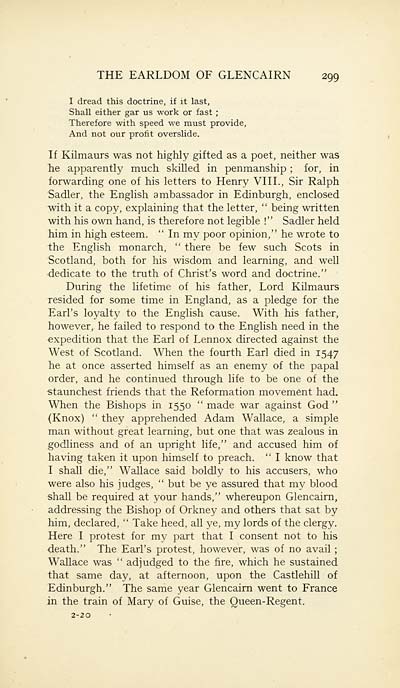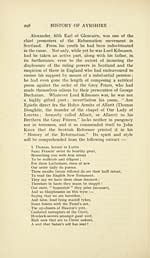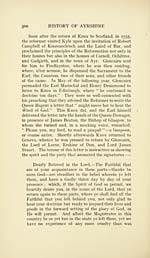Download files
Complete book:
Individual page:
Thumbnail gallery: Grid view | List view

THE EARLDOM OF GLENCAIRN 299
I dread this doctrine, if it last,
Shall either gar us work or fast ;
Therefore with speed we must provide,
And not our profit overslide.
If Kilmaurs was not highly gifted as a poet, neither was
lie apparently much skilled in penmanship ; for, in
forwarding one of his letters to Henry VIII., Sir Ralph
Sadler, the English ambassador in Edinburgh, enclosed
with it a copy, explaining that the letter, " being written
with his own hand, is therefore not legible !" Sadler held
him in high esteem. " In my poor opinion," he wrote to
the English monarch, " there be few such Scots in
Scotland, both for his wisdom and learning, and well
dedicate to the truth of Christ's word and doctrine."
During the lifetime of his father, Lord Kilmaurs
resided for some time in England, as a pledge for the
Earl's loyalty to the English cause. With his father,
however, he failed to respond to the English need in the
expedition that the Earl of Lennox directed against the
West of Scotland. When the fourth Earl died in 1547
he at once asserted himself as an enemy of the papal
order, and he continued through life to be one of the
staunchest friends that the Reformation movement had.
When the Bishops in 1550 " made war against God "
(Knox) " they apprehended Adam Wallace, a simple
man without great learning, but one that was zealous in
godliness and of an upright life," and accused him of
having taken it upon himself to preach. " I know that
I shall die," Wallace said boldly to his accusers, who
were also his judges, " but be ye assured that my blood
shall be required at your hands," whereupon Glencairn,
addressing the Bishop of Orkney and others that sat by
him, declared, " Take heed, all ye, my lords of the clergy.
Here I protest for my part that I consent not to his
death." The Earl's protest, however, was of no avail ;
Wallace was " adjudged to the fire, which he sustained
that same day, at afternoon, upon the Castlehill of
Edinburgh." The same year Glencairn went to France
in the train of Mary of Guise, the Queen-Regent.
I dread this doctrine, if it last,
Shall either gar us work or fast ;
Therefore with speed we must provide,
And not our profit overslide.
If Kilmaurs was not highly gifted as a poet, neither was
lie apparently much skilled in penmanship ; for, in
forwarding one of his letters to Henry VIII., Sir Ralph
Sadler, the English ambassador in Edinburgh, enclosed
with it a copy, explaining that the letter, " being written
with his own hand, is therefore not legible !" Sadler held
him in high esteem. " In my poor opinion," he wrote to
the English monarch, " there be few such Scots in
Scotland, both for his wisdom and learning, and well
dedicate to the truth of Christ's word and doctrine."
During the lifetime of his father, Lord Kilmaurs
resided for some time in England, as a pledge for the
Earl's loyalty to the English cause. With his father,
however, he failed to respond to the English need in the
expedition that the Earl of Lennox directed against the
West of Scotland. When the fourth Earl died in 1547
he at once asserted himself as an enemy of the papal
order, and he continued through life to be one of the
staunchest friends that the Reformation movement had.
When the Bishops in 1550 " made war against God "
(Knox) " they apprehended Adam Wallace, a simple
man without great learning, but one that was zealous in
godliness and of an upright life," and accused him of
having taken it upon himself to preach. " I know that
I shall die," Wallace said boldly to his accusers, who
were also his judges, " but be ye assured that my blood
shall be required at your hands," whereupon Glencairn,
addressing the Bishop of Orkney and others that sat by
him, declared, " Take heed, all ye, my lords of the clergy.
Here I protest for my part that I consent not to his
death." The Earl's protest, however, was of no avail ;
Wallace was " adjudged to the fire, which he sustained
that same day, at afternoon, upon the Castlehill of
Edinburgh." The same year Glencairn went to France
in the train of Mary of Guise, the Queen-Regent.
Set display mode to:
![]() Universal Viewer |
Universal Viewer | ![]() Mirador |
Large image | Transcription
Mirador |
Large image | Transcription
Images and transcriptions on this page, including medium image downloads, may be used under the Creative Commons Attribution 4.0 International Licence unless otherwise stated. ![]()
| Histories of Scottish families > Ayrshire > Volume 2 > (309) Page 299 |
|---|
| Permanent URL | https://digital.nls.uk/95192806 |
|---|
| Attribution and copyright: |
|
|---|---|
| Description | A selection of almost 400 printed items relating to the history of Scottish families, mostly dating from the 19th and early 20th centuries. Includes memoirs, genealogies and clan histories, with a few produced by emigrant families. The earliest family history goes back to AD 916. |
|---|

